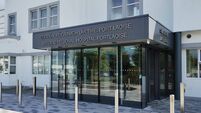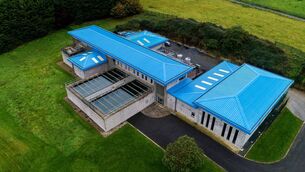Academic with links to the past says closure of sugar factory was ‘needless’

Professor Allan J Navratil
PROFESSOR Allan J Navratil was on a mission when he drove from his Midleton home in southeast Co Cork to Carlow’s Seven Oaks Hotel on Tuesday night, 19 November last.
The occasion was the launch of Christopher Power’s book , sub-titled . The Carlow sugar plant closed on 11 March 2005 with the loss of 190 full-time and 130 seasonal jobs.
Alerted by a nephew in Hong Kong to the launch of a book about the Carlow sugar factory, Allan, who turned 87 on Thursday 28 November, came to Carlow armed with a synopsis of what he headlined , a copy of which he provided to .
But that is to go too far, too fast, as Allan J Navratil has a strong association with Carlow and its former sugar factory through his late father Afred Navratil, who was centrally involved in the establishment of factory in 1926.
Allan’s father was a native of Brno in southeast Czechoslovakia, born in 1895, who came to Ireland in 1925 at the request of taoiseach WT Cosgrave. An engineer and a chemist, Mr Navratil was asked by Mr Cosgrave to identify an ideal location for an Irish sugar factory, and he reached the conclusion that Carlow, from all viewpoints, was the most suitable place to locate such a project.
Like a number of east European engineering experts who came to Carlow at that time to provide the expertise for the establishment of the country’s first sugar-processing plant, Mr Navratil, along with some colleagues, resided in The Clubhouse at Court Place, later St Brigid’s Hospital, and today in use as a migrant centre.
“He came to Carlow for the building of the factory, returned to Czechoslovakia, where he married his fiancée Vojteska, before coming back to take up a management post with the Carlow sugar plant,” son Allan recalls.
Subsequently, the Navratil family lived in one of the houses at Strawhall, Carlow for factory personnel – houses which he himself designed and built, using the ash from sugar factories’ furnaces as cement. Mr Navratil left Carlow in 1932-33, when he was promoted to the post of manager for the construction of the Mallow sugar factory.
In 1939, he bought a farm in Ballinacurra, Midleton, where he put his knowledge of the industry to good use by producing sugar beet seed, which was unobtainable during the war years. From 1946 onwards, he farmed exclusively. He died in 1990, aged 95.
His son Allan continues to farm at Ballinacurra and since 2003 also in Canada. He was recently appointed adjunct professor and lecturer within the College of Science, Engineering and Food Science at UCC.
Among the items Allan brought to Carlow was a citation to his dad, to mark his departure from the Barrowside town in 1932-33. The citation was signed on behalf of the employees at the Athy Road sugar beet processing plant by E Geoghan, Wm Trundle, A McGill and Chas Bale.
The citation, bearing a head and shoulders photo of Mr Navratil at the top, states:
However, his connection with Carlow continued. In the summer of 1948 following a sit-down strike, General Costello asked Mr Navratil to take charge of a corps of army engineers to put the Carlow factory back in operation. The general offered him an armed escort, which he politely declined. His excellent past relationship with the workers stood him in good stead and within a few weeks the campaign was completed without incident.
In his supplied synopsis on ***Sugar manufacture in Ireland***, Allan Navratil subtitled his subject matter: ***The rationale for the restoration of the Irish sugar industry and why it should never have been closed***. The following is his synopsis on the native sugar industry.
He first acknowledged that in 2006 the EU Sugar Reform Programme was aimed at reducing the EU’s sugar production under pressure from Australia, Brazil and Thailand. Continuing, he wrote: ‘Irish sugar was so well amortised over 80 years that the return on invested capital was over 30% – in plain language, it was highly profitable and there was absolutely no need for closure’.
But the scheme was poorly conceived, hastily implemented and, it transpired, not regulated at all.
Four years later, the EU Court of Auditors determined that EU administration personnel used stale, and thus flawed, data for Ireland.
Owners Greencore, under self-inflicted financial pressure, saw closure as fast and easy money. Greencore also thought its sites were valuable, which proved to be a total illusion. The government, as holder of the special share, abjectly failed to exercise its right to prevent closure.
The EU unfairly imposed time limits for compensation on all parties on a ‘take it or leave it’ basis. This compulsion was as unethical as it was prejudicial to properly informed consideration.
Not surprisingly, such imposed haste led to pressurised, consequently poor, decision making. Growers and workers, by being rushed and poorly informed, their interests were shamefully compromised.
In 2006, Ireland, as an island, was the only EU country to lose its entire sugar industry. Four years later, the EU’s Court of Auditors adjudicated that Ireland’s sugar closure was needless.
In his synopsis, Allan Navratil states the adverse effects on Ireland were manifold: the tillage sector was seriously disadvantaged, despite farmers having received minimal compensation under the scheme. And an island nation now has to import all its sugar needs and sugar by-products.
Professor Navratil points out that:
• After the fact, the EU Court of Auditors found in 2010-11 that the closure of the Mallow sugar factory (and other European factories) was “needless”
• The hasty and inadequate administration by the EU of their sugar reform needlessly deprived Ireland of a fundamental, many-faceted indigenous industry
• This does not accord with the ethos that may have been persuasive to Ireland’s induction and, being an island, the entire population of the 32 counties remains negatively impacted by the senseless closure of our sugar industry.
He sums up the situation in these persuasive terms: ‘None of the decision makers have “clean” hands. Culpability exists at all levels for the staggeringly egregious and mindlessly myopic, ill-conceived and inconsiderate decisions that caused the loss of a key industry.’ Professor Navratil then went on in his synopsis to outline the manifold benefits of an indigenous sugar manufacturing facility.
After his brief sojourn in Carlow and a cup of tea, this sprightly, resolute octogenarian disappeared into the night to make the two hours-plus drive home to his Midleton home!




